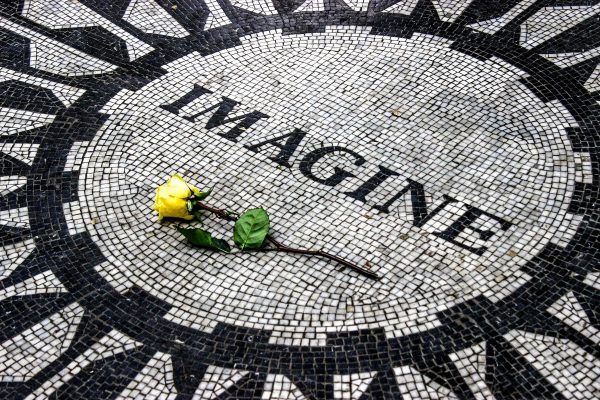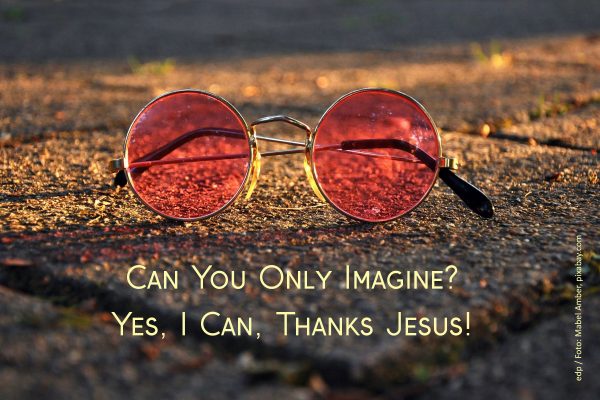
Als ich vor einigen Jahren das Wort „Paradies“ in eine Internetsuchmaschine eingab, fand diese ungefähr 22 Millionen Treffer. Woran liegt es, dass dieser Begriff so häufig vorkommt? Das Paradies begegnet uns immer wieder, zum Beispiel in der Literatur, in der Musik und in der Welt des Kinos. Ich denke dabei an Filme, die auf sehr unterschiedliche Weise die Sehnsucht nach einem Ort der Vollkommenheit, Geborgenheit und ungetrübter Freude darstellen. Die Entdeckung oder gar die (Rück-)Eroberung des Paradieses ist ein alter Menschheitstraum, der den Menschen so lange begleiten wird, bis … ja, bis wann denn?
In allen Menschen steckt eine tiefe Sehnsucht: Das, was wir hier auf dieser Erde kennen und erleben, darf nicht alles sein. Es muss etwas geben, was darüber hinausgeht. Bereits der Kirchenvater Augustinus von Hippo (354–430) wusste um diese Sehnsucht, als er schrieb: „Unruhig ist unser Herz, bis es ruhig wird, o Gott, in dir.“ Wie macht sich diese Sehnsucht bemerkbar? Worin besteht sie eigentlich? Einige Aspekte dieser Sehnsucht will ich hier aufzählen:
▪ Die Sehnsucht, am Ende einer langen Lebensreise das Ziel zu erreichen, anzukommen, ein Zuhause zu haben und es nie mehr verlassen zu müssen.
▪ Die Sehnsucht, die Menschen wiederzusehen, die wir geliebt haben und die der Tod von uns genommen hat, um uns nie wieder von ihnen trennen zu müssen.
▪ Die Sehnsucht, nicht zu altern, gesund und fit zu bleiben, unsterblich zu sein und endlos – also ewig – zu leben.
▪ Die Sehnsucht, kein Leid zugefügt zu bekommen und auch keines zu verursachen – weder Menschen noch Tieren oder Pflanzen.
▪ Die Sehnsucht, in Frieden mit allen Menschen zu leben – ohne Kriege, ohne Ausbeutung, ohne Angst, ohne Mauern und Grenzen.
▪ Die Sehnsucht, nichts mehr zu denken, zu sagen oder zu tun, was unrecht ist, Gott entehrt oder Mitmenschen schadet.
▪ Die Sehnsucht, die Wirklichkeit zu verstehen, hinter die Kulissen der Geschichte und des eigenen Lebens zu blicken, Hintergründe und Zusammenhänge zu erkennen und zu begreifen, Antwort auf ungelöste Fragen und Rätsel zu bekommen.
▪ Die Sehnsucht, Recht zugesprochen zu bekommen, wenn man ignoriert, missverstanden, falsch beurteilt oder gar zu Unrecht verurteilt worden ist.
▪ Die Sehnsucht, den Wissensdurst gestillt zu bekommen, neue Welten zu entdecken, neue Dimensionen des Lebens zu erleben, über unbegrenzte Zeit und Bewegungsfreiheit zu verfügen.
▪ Die Sehnsucht, Liebe zu erfahren und Liebe zu geben – frei von negativen Gefühlen oder egoistischen Beweggründen.
Wie empfindest du beim Lesen dieser Aufzählung? Sind das auch Dinge, nach denen du dich sehnst? Sind diese Wünsche etwas für Träumer? Klingt alles utopisch in deinen Ohren? Hast du eine Vorstellung, ob bzw. wie das alles in Erfüllung gehen könnte? Ich glaube daran, dass diese Liste keine Utopie ist, sondern Wirklichkeit werden kann. Ja, Wirklichkeit werden wird! Aber nicht aus eigener, menschlicher Kraft, auch nicht als Ergebnis vom wissenschaftlichen Fortschritt, sondern durch den Schöpfergott, der diese tiefe Sehnsucht, dieses Vakuum in unser Herz gelegt hat.
Wie und wann er das macht und abschließen wird, das ist der Inhalt meiner zwei letzten Bücher „Leben 2.0“ und „Leben 3.0“, die ich 2010 bzw. 2012 geschrieben habe – und die ich heute verschenke:
Ich habe diese zwei Bücher mit der Absicht geschrieben, das verständlich und lebensnah zu vermitteln, was mir der Glaube an Gott persönlich bedeutet. Und weil ich in Gottes Wort, der Bibel, die Antwort auf sehr viele relevante Fragen gefunden habe.
Lesermeinungen zu „Leben 2.0“:
• Ein erfrischendes Buch, welches aufzeigt, in welcher Zeit wir leben, aber auch welche Aussichten uns bevorstehen.
• Sehr einfühlsam und verständlich geschrieben. Es eignet sich wunderbar zum Weitergeben an Menschen, die auf der Suche sind.
• Die Sprache ist einfach, klar und sehr gut verständlich … Man will es nicht aus der Hand legen. Wir kennen kein Buch, das sich besser zum Verschenken eignen würde, als Leben 2.0.
Diese kleinen Bücher (144 bzw. 96 Seiten) sind im Advent-Verlag Lüneburg erschienen und tausendfach verkauft worden. Da ich auf jegliche Honorare von Anfang an verzichtet habe, bekomme ich vom Verlag ab und zu Exemplare zum Weiterschenken. Daher gebe ich sie gern weiter – kostenlos, unverbindlich, versandkostenfrei. Einfach per E-Mail anfordern, gewünschten Titel (auch beide möglich) und Versandadresse angeben.
• Buch/Bücher geschenkt anfordern
Beschreibung, Inhaltsverzeichnis, Leseprobe:
Beide Bücher sind auch als E-Book zum Herunterladen sofort erhältlich (ePUB- und Mobi-Format).
![]()
The longing for paradise
When I typed the word “paradise” into an internet search engine a few years ago, it found around 22 million hits. Why is this term so common? We encounter paradise again and again, for example in literature, in music and in the world of cinema. I’m thinking of films that depict the longing for a place of perfection, security and unadulterated joy in very different ways. The discovery or even the (re)conquest of paradise is an old human dream that will accompany mankind until … well, until when?
There is a deep longing in all people: What we know and experience here on this earth cannot be all there is. There must be something that goes beyond it. The church father Augustine of Hippo (354-430) already knew about this longing when he wrote: “Our heart is restless until it becomes calm, O God, in you.” How does this longing manifest itself? What does it actually consist of? I would like to list some aspects of this longing here:
▪ The longing to reach the destination at the end of a long journey through life, to arrive, to have a home and never have to leave it again.
▪ The longing to see the people we loved again and whom death has taken from us so that we never have to part from them again.
▪ The longing not to age, to stay healthy and fit, to be immortal and to live endlessly – i.e. eternally.
▪ The longing not to be harmed and not to cause any harm – neither to people, animals or plants.
▪ The longing to live in peace with all people – without wars, without exploitation, without fear, without walls and borders.
▪ The longing to no longer think, say or do anything that is wrong, dishonours God or harms fellow human beings.
▪ The longing to understand reality, to look behind the scenes of history and one’s own life, to recognise and understand backgrounds and connections, to find answers to unresolved questions and riddles.
▪ The longing to be proven right when you have been ignored, misunderstood, misjudged or even wrongly condemned.
▪ The longing to have one’s thirst for knowledge quenched, to discover new worlds, to experience new dimensions of life, to have unlimited time and freedom of movement.
▪ The longing to experience love and to give love – free from negative feelings or selfish motives.
How do you feel when you read this list? Are these also things you long for? Are these wishes for dreamers? Does it all sound utopian to you? Do you have any idea whether or how it could all come true? I believe that this list is not a utopia, but can become reality. Yes, it will become reality! But not by our own human power, nor as a result of scientific progress, but through the Creator God, who has placed this deep longing, this vacuum in our hearts.
How and when he will do this and complete it is the content of my two books “Leben 2.0” and “Leben 3.0”, which I wrote in German in 2010 and 2012 respectively. And which I am now giving to German-speaking readers free of charge.
![]()
El anhelo del paraíso
Cuando hace unos años escribí la palabra “paraíso” en un buscador de Internet, encontré alrededor de 22 millones de resultados. ¿Por qué es tan común este término? Encontramos el paraíso una y otra vez, por ejemplo en la literatura, en la música y en el mundo del cine. Me refiero a películas que describen de formas muy diferentes el anhelo de un lugar de perfección, seguridad y alegría perfectas. El descubrimiento o incluso la (re)conquista del paraíso es un viejo sueño humano que acompañará a la humanidad hasta… bueno, ¿hasta cuándo?
Hay un profundo anhelo en todas las personas: Lo que conocemos y experimentamos aquí en esta tierra no puede ser todo lo que existe. Tiene que haber algo que vaya más allá. Agustín de Hipona (354-430) ya conocía este anhelo cuando escribió: “Nuestro corazón está inquieto hasta que se calma, oh Dios, en ti”. ¿Cómo se manifiesta este anhelo? ¿En qué consiste realmente? Me gustaría enumerar aquí algunos aspectos de este anhelo:
▪ El anhelo de llegar al destino al final de un largo viaje por la vida, de llegar, de tener un hogar y no tener que abandonarlo nunca más.
▪ El anhelo de volver a ver a los seres queridos que la muerte nos ha arrebatado para no tener que separarnos nunca más de ellas.
El anhelo de no envejecer, mantenerse sano y en forma, ser inmortal y vivir sin fin, es decir, eternamente.
▪ El anhelo de no ser dañado y de no causar ningún daño, ni a las personas, ni a los animales, ni a las plantas.
▪ El anhelo de vivir en paz con todas las personas: sin guerras, sin explotación, sin miedo, sin muros ni fronteras.
▪ El anhelo de no volver a pensar, decir o hacer nada que esté mal, deshonre a Dios o dañe a nuestros semejantes.
▪ El anhelo de comprender la realidad, de mirar entre bastidores de la historia y de la propia vida, de reconocer y comprender antecedentes y conexiones, de encontrar respuestas a preguntas y enigmas sin resolver.
▪ El anhelo de que te den la razón cuando te han ignorado, malinterpretado, juzgado erróneamente o incluso condenado injustamente.
▪ El anhelo de saciar la sed de conocimiento, de descubrir nuevos mundos, de experimentar nuevas dimensiones de la vida, de disponer de tiempo y libertad de movimiento ilimitados.
▪ El anhelo de experimentar el amor y de dar amor, libre de sentimientos negativos o motivos egoístas.
¿Qué sientes al leer esta lista? ¿Son también cosas que anhelas? ¿Son deseos de soñadores? ¿Te parece todo utópico? ¿Tienes alguna idea de si todo esto podría hacerse realidad o cómo? Personalmente creo que esta lista no es una utopía, sino que puede hacerse realidad. Sí, ¡se hará realidad! Pero no por nuestro propio esfuerzo humano, ni como resultado del progreso científico, sino a través del Dios Creador, que ha puesto este profundo anhelo, este vacío en nuestros corazones.
Cómo y cuándo lo hará y finalizará es el contenido de mis dos libros “Leben 2.0” y “Leben 3.0”, que escribí en 2010 y 2012 respectivamente en alemán. Y que ahora ofrezco regalados a lectores que comprendan este idioma.




